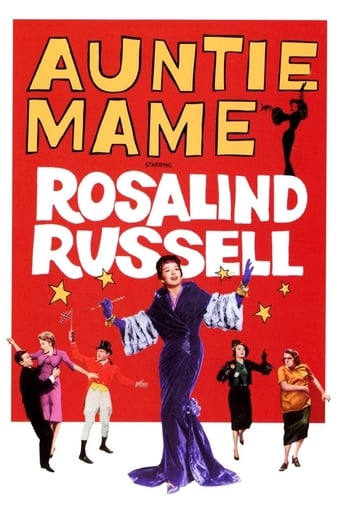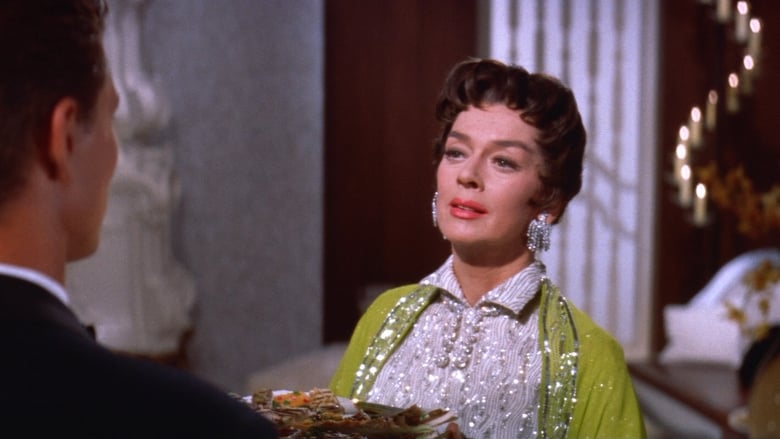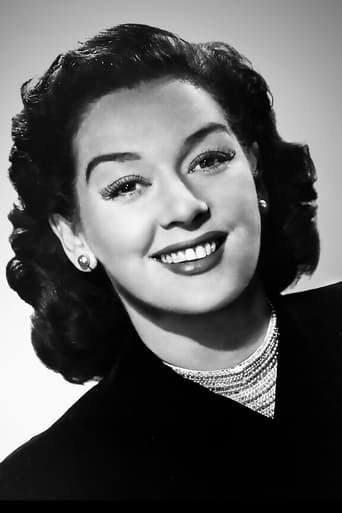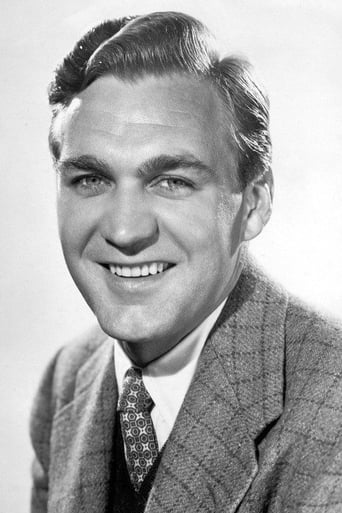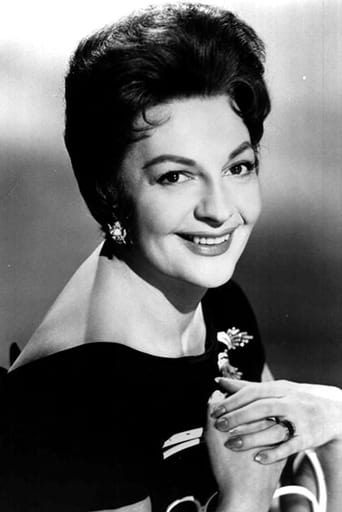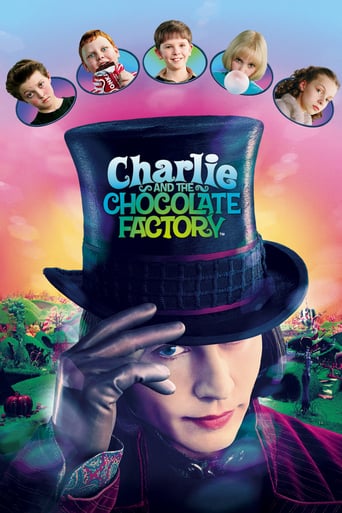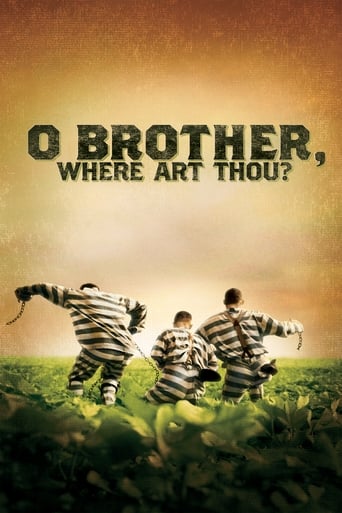Auntie Mame (1958)

Mame Dennis, a progressive and independent woman of the 1920s, is left to care for her nephew Patrick after his wealthy father dies. Conflict ensues when the executor of the father's estate objects to the aunt's lifestyle and tries to force her to send Patrick to prep school.
Watch Trailer
Cast


Similar titles
Reviews
I've read the book this film is based on, and while I would hardly call it an accurate representation of the book, if taken at face value this film is quite enjoyable really. The sets and costumes really are exceptionally well done and it was a visual delight from beginning to end. All of the performances are solid and in particular Russell does a great job realistically enthusing her character with joy, gusto, and energy. The general story/message of the film is simple but true and always relevant. The only issue I had with the film was Patrick's eventual girlfriend/fiancee, which is such a despicable character that it's hard to imagine someone with Patrick's upbringing going for someone like her. I understand that she was a foil used to represent certain a class/group of society the film is poking fun at, but I don't think they needed to paint her that broadly to make the point. Nevertheless, I very much enjoyed spending time with Auntie Mame.
A truly brilliant movie that can be enjoyed over and over every time you see it but sadly Lucille Ball's musical remake version (Mame) changing aspects of the original plot, changing some of the characters and replacing many things that made Rosalind Russel's 1958 Auntie Mame a joy to watch with some mediocre acting and lame show tunes. MAME is indeed a musical movie to avoid but Auntie Mame is truly a classic. ☺
Going into this movie, I had an open mind but expected a stagy, dated comedy. I was very pleasantly surprised to find a snappy, frank, and surprisingly fresh comedy filled with delightful performances and dialogue, colorful costumes and set designs, and a clichéd but solid message about life. Rosalind Russell plays Mame Dennis, who takes in her nephew Patrick (Jan Handzlik) after her brother unexpectedly dies. What ensues is a very fun romp about the adventures and trials of Mame and Patrick over 9 years as he grows up and they weather the Great Depression. The film is populated by a wide assortment of colorful, entertaining characters and comedic situations. And, for a 54-year-old movie, I actually found it to be hilarious. I laughed out loud several times throughout, for example when Mame at one point tries to mount a horse, and the dialogue is genuinely funny without straining too hard, with jokes rarely falling flat. The film's comedic success is amplified by its enormous heart, which takes center stage during several dramatic, emotional moments. The film wears its heart on its sleeve but never lapses into overdone sentimentality. As the movie's famous line goes, "Life's a banquet, and some poor suckers are starving to death." The film's message to live your own way and to the fullest no matter what really resonates, even if it is a bit unoriginal. The film takes thinly veiled shots at the norms, prejudices, and judgments of mid-20th century American society. It has a blast shooting down anti-Semitism, socioeconomic elitism, social judgment (involving such topics as unmarried pregnancy), to name a few, and it's 143-minute runtime flies by. The film itself, especially the cast, seems to be having a great time as it progresses, and I couldn't help but to be sucked right in. The performances are very good across the board. Rosalind Russell is just perfect as Mame, capturing her larger-than-life personality and big heart. She's an ace at spouting out the character's lightning-fast lines with impeccable comic timing. Coral Browne also gives a great comic performance as Vera, although she doesn't have as much depth as Russell. The rest of the supporting cast are all very good as well. Jan Handzlik is endearing and funny as a young Patrick, and Peggy Cass is outstanding in a paper-thin role (she did a good job, but her Oscar nomination is perplexing). I also thought Joanna Barnes was a riot as Gloria, and Lee Patrick and Willard Waterman are excellent as her parents. Overall, Auntie Mame is a hugely entertaining, even uplifting movie filled with wacky characters, spot-on comedic performances, hilarious writing, and a big heart. It's not the deepest movie you'll ever see, or the least conventional, but it's an absolute delight. Highly recommended.
This story of a boy from the Midwest being raised by his rich and whimsical "Auntie Mame" in New York at times is funny as hell and Rosalind Russell is the ideal person for Mame. It begins when she takes custody of her nephew, Patrick Dennis, in 1928 and continues through Dennis's adulthood and marriage.There's one scene that is emblematic of Russell's perfection. It's the middle of the Great Depression. Everyone is broke, Mame included. Her Picassos have been pawned. Her house boy and maid are working for no salary. And Mame bumps into a terribly wealthy Southerner, Beauregard Jackson Pickett Burnside. No, nobody knows how that "Burnside" got in the pantheon. This is Forrest Tucker with a Georgia accent. He loves Russell and appears finally to have built up the nerve to ask her. She's seated, waiting nervously for him to get on with it, and he's on his knee, holding her hand in his, stumbling over the words, while she smiles, fiddles, twitches, her frenzied eyes darting back and forth. It's the most hilarious marriage proposal since the stuttering Eddie Bracken proposed to the eagerly receptive and very pregnant Betty Hutton in "The Miracle of Morgan's Creek." It isn't Tucker who's funny. He hits his marks and says his lines, but it's Russell's performance that gives the scene its amazing comedic lift.Most of the movie -- the best parts -- are frantic in a similar way. Something of extreme importance is immanent. Big shot visitors are about to appear, or Mame is late in making her stage entrance, and the preparations must be rushed. The movie is cleaner than the play was. I suppose what was left of the code prevented little Dennis from describing how, in school, he swam among the naked girl students spreading the sperm. The movie just has him swimming among them. The pace slows from time to time and it's here that one of the weaknesses in the script appear.The story gets sentimental. Ugh. The giggling Japanese butler and the earthy Irish maid put their life savings together to buy Mame a cheap bracelet for Christmas. Tears are in everyone's eyes as the musical score turns sappy. Some viewers may have had tears too but because of the slight pain induced by the bathos.Another weakness is that sometimes the frenetic activity is more silly than funny. It's exhausting to see so much rushing about. And Ito the house boy isn't well written. I mean, seeing someone giggle isn't in itself amusing. Another is in the continuity of character. For the entirety of her life, Russell has been an innovator. If a new fad appears, she dives head first into it. In 1928 she and her Bohemian friends are deeply into psychoanalysis and Montessori schools. The decor of her apartment changes with the wind. But when she runs into the family of Dennis's fiancée, she becomes rather too traditional. She's repulsed by her host's daiquiri because it's made with honey, for instance. The earlier Mame would have tossed it off with a wise crack.There's something askew with that whole high-born family that lives in Mountebank, Connecticut. I get the joke. A mountebank is a boastful and shallow pretender. But the Upson family of Mountebank wouldn't have objected to Mame's deliberate planting of "avant garde" mobiles in her living room. They'd be too dumb to know it was avant garde. The Upsons don't act like the stuffy old money they're presumed to represent. They're nouveau riche and retain some of the crudity of their original class. They wouldn't lead lives of such flagrant ostentation if they were established. Willard Waterman wears a loud sports jacket. If his money were a generation or more old, he would be in subdued clothes, not particularly fashionable, but expensive and made to wear like iron.And the "top drawer" girl's school that Joanna Barnes attends would have been far more demanding than is indicated, although I must say I knew a young lady who went to such a school, when it was still called Rosemary Hall, and was taught "creative walking." As the air headed fiancée, Joanna Barnes has the role down pat. It's hard to imagine how her performance could be improved. And Barnes should know. Her New England family lived in the same house since the 17th century and she herself is a Smithie. She knew whereof she parodied.These aren't major flaws. The scenes in themselves still carry laughs but each break in character, each blemish in the capture of social class, while necessary to produce the laughs, is something of a jolt.The film ought to have a devoted gay following. I'd be surprised if it didn't. The heroine is a tough, willful, and extremely feminine babe who defies age and convention and delivers insults like rapier thrusts. ("I'll hold my breath until tomorrow morning," says a rival. "Yes, do that," replies Mame.) She's like Margo Channing on steroids.

